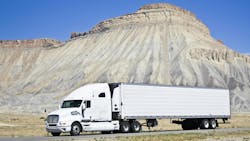Roeth: Remember, you chose to ride the roller coaster
I was very fortunate to attend meetings put on by the two preeminent forecasters in the trucking industry—ACT Research and FTR. During the past 20 years, I have attended their events from time to time, but this year I was especially interested in hearing what they had to say about the state of freight and production levels over the next several years.
At both meetings, I was reminded of one fairly obvious thing: Truck production levels can be dramatically different from one year to the next. Let me share some numbers with you that illustrate how wide the swing can be. There were 120,000 Class 8 trucks produced in 2009, the lowest production level over the last 20 years. Conversely, OEMs made 349,000 trucks in 2018, the year with the highest production. That is almost three times more trucks than were made in 2009. The single biggest change between two years happened between 2015 and 2016. A total of 320,000 trucks were built in 2015, while only 226,000 were built in 2016. To be clear, there may have been a bigger drop caused by other factors, but the 2015-2016 drop was basically caused by changes in economic conditions.
It is important to also remember that things other than the economy can disrupt production; the pandemic being one of them. Lots of factories shut down, and we did not need as many trucks because there was not as much freight moving. Regulations can also impact production numbers by causing fleets to prebuy trucks, forcing a very high level of vehicle production one year and a very low level of production the next.
This is a challenge for our industry. Do we add a second shift, maybe even build another plant? Do we downsize, releasing people during low times? How will we hire and train to ramp back up? Are our suppliers prepared for this? These are a whole bunch of questions with serious repercussions. Some would say we, as an industry, have learned our lessons and will avoid these big swings. They say that the supply chain issues of the pandemic make us smarter about increasing production too much. I am not so sure.
See also: Fleets Explained: Emissions regulations
The other thing to remember is that the mix of the types of trucks being built can change too. One year there may be a need for more sleepers than day cabs, but the next year day cabs may be more in demand. I think we are going to see even more changes to the types of trucks being built as we navigate through the powertrain transformation that we are undergoing at the moment.
You might be thinking, Mike, what's your point? And I get that. Most of what I have said is not new, but sometimes it is good to have a reminder that all of us in trucking have chosen to be on this roller coaster of production-level highs and lows. Frankly, I do not see that changing anytime soon, so we all just need to buckle up, hold on, and try to enjoy the ride.
About the Author

Michael Roeth
Executive Director
Michael Roeth is the executive director of the North American Council for Freight Efficiency. He serves on the second National Academy of Sciences Committee on Technologies and Approaches for Reducing the Fuel Consumption of Medium and Heavy-Duty Vehicles and has held various positions with Navistar and Behr/Cummins.
